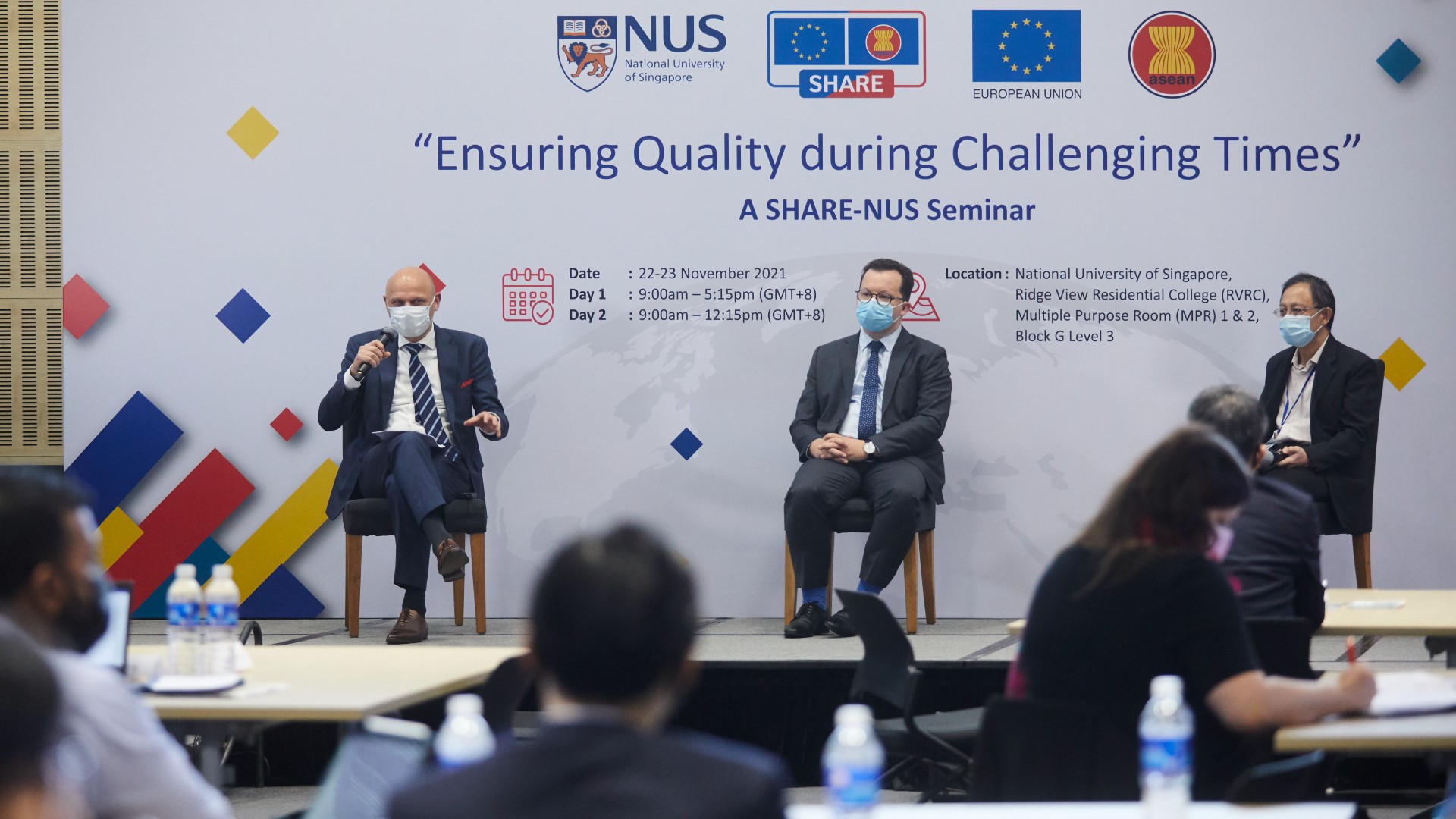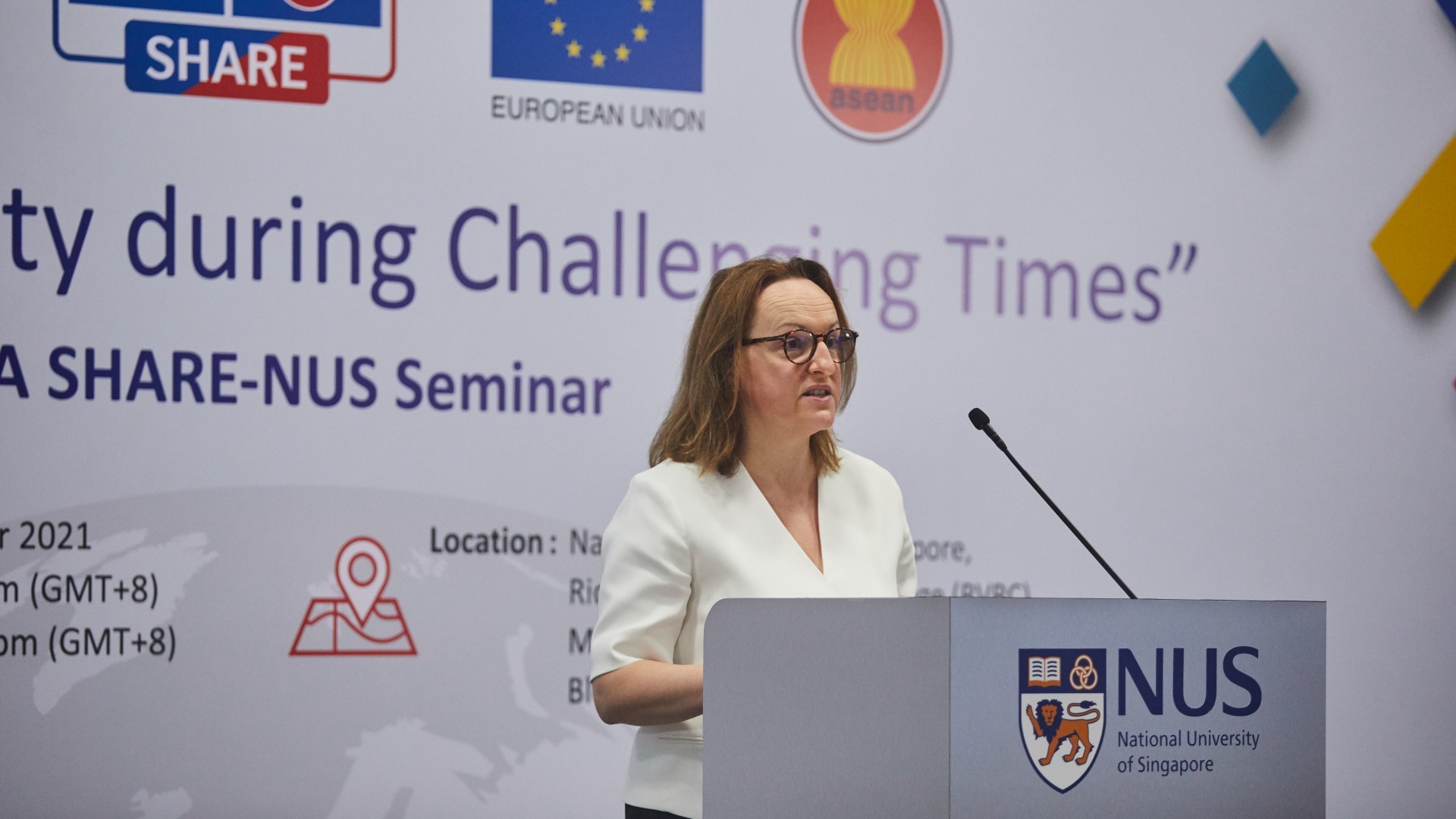Delivering quality education through blended learning and international exposure
December 4, 2021

More than 18 months after COVID-19 disrupted life as we know it, life is still in limbo for some as stop-start restrictions remain necessary to curb further waves of the virus. But education has proven largely resilient in the face of a dynamic situation, said educators at the SHARE-NUS Seminar.
Held over two days from 22 to 23 Nov, the forum was attended by education leaders from Asia and Europe, who shared insights under the theme, “Ensuring Quality during Challenging Times”. The Support to Higher Education in the ASEAN Region (SHARE) Programme is the European Union’s flagship higher education programme with ASEAN.
Discussions included how both digital and physical touchpoints are necessary for success in education, while giving students a global experience will have a positive impact on their learning.
“Education will involve a blend of technology and face-to-face interactions,” said NUS President Professor Tan Eng Chye in his opening address. “We anticipate there will be complementation in terms of internships, field work and capstone projects to enhance learning.”

With technology as a key enabler in the new norm of teaching, coupled with strong international collaboration, universities will be able to navigate the complex environment ahead while ensuring quality education.
Pandemic challenges
Safe distancing measures have been a mainstay since the pandemic began. Schools scrambled to keep students safe without compromising their education, but thousands who were on exchange programmes had to be brought home, causing them to miss out on valuable cross-cultural experiences.
The University also implemented temperature checks and created a learning dashboard for students to verify their health status before classes.
One of the most difficult challenges was providing a safe and secure mode of assessment. Exam venues that could hold hundreds had their capacities slashed and as a result, NUS had to move exams online and “recalibrate” its proctoring.
“In the past, our assessment system had always been based on a previous format, but now we are moving into virtual proctoring,” Prof Tan explained during the Presidents’ Dialogue. “I think universities do have tremendous capacity to re-tune their quality assurance according to the evolving changes in each of our systems.”
Tech-infused hybrid education
To iron out the kinks, NUS has utilised technology by working with companies like Zoom and Microsoft to rethink assessment in a manner that still challenges students and, more importantly, deters cheating.
For example, it mandated mock online exams to stress-test video platforms and created infographics to guide students on the examination procedures. During the actual exams, teachers monitor students virtually to ensure that cheating does not take place.
“Anywhere in the world, you realise that online assessments are not something that’s done well,” said Associate Professor Erle Lim, NUS Vice Provost (Teaching Innovation & Quality). “But at the end of the day, in a professional school, there are certain standards to meet, so you can’t say, ‘Let’s not have exams’.”

Technological innovation at NUS also goes beyond exams. Resource channel geNiUSworld was created two years ago for staff and students to access and share learning materials such as books and videos. Teachers who are comfortable with recording their lectures can also do so in studios around campus and have them edited and subtitled.
But these digital strides will not replace physical human interaction; in fact, the school employs a hybrid model that involves face-to-face and online teaching.
“In our view, fully virtual teaching and learning are still not satisfactory. But we will not be going back to the traditional sage-on-the-stage type of teaching,” said Prof Tan. “From NUS’ perspective, we see a need to gear up professors and students to the new type of teaching and learning.”
NUS also caters to students who are unable to access this form of learning, by preparing alternative venues or providing the necessary equipment for them to do so.
Prof Lim added, “I would say that the pandemic, rather than being an existential crisis, is an opportunity for evolution. We have people embracing technology now in a way that’s never been seen before.”
Greater international collaboration
Internal transformation aside, NUS is now looking to foster greater international cooperation by restarting overseas exchange programmes and reaffirming partnerships.

“The opportunity to live and study in another country and immerse oneself in another culture as a student offers unparalleled experiences that shape lives, careers and futures,” said Her Excellency Iworna Piorko, Ambassador of the European Union to Singapore.
From next January, the University will be sending more than 1,000 students abroad – an encouraging step as vaccination rates around the world grow, noted Professor Bernard Tan, NUS Senior Vice-Provost (Undergraduate Education).

With an ecosystem comprising foreign students and academic staff from more than 100 countries, NUS has a thriving global community, paving the way for more collaboration between European Union and ASEAN universities.
“It’s quite exciting, with different universities co-teaching to expand the horizon even further,” said Dr Dujeepa Samarasekera, Senior Advisor of the NUS Centre for Development of Teaching & Learning and Senior Director at the Centre for Medical Education at NUS.


